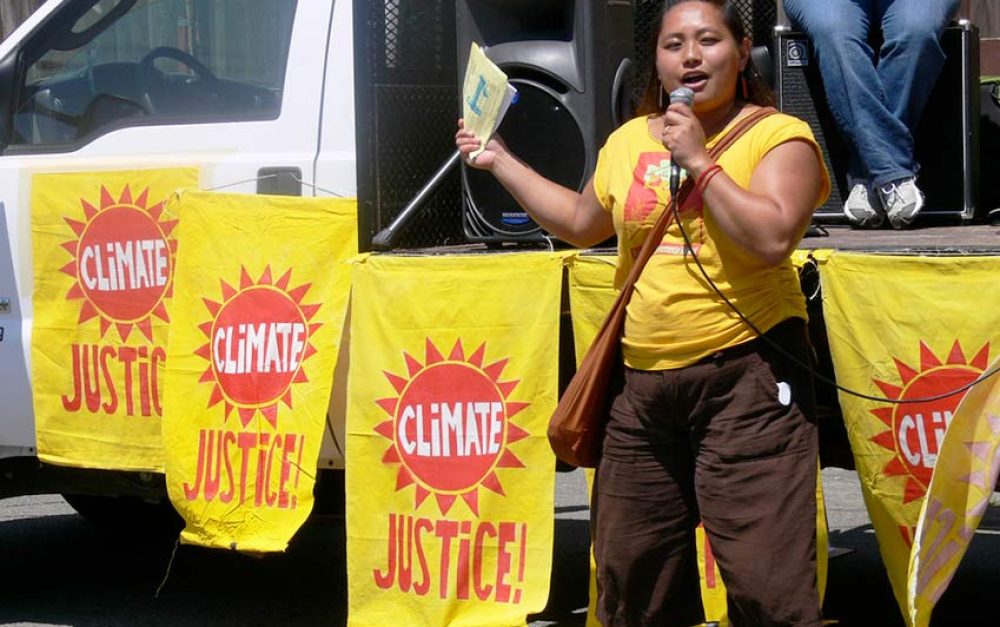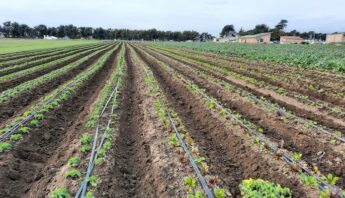Last month, governments gathered in Marrakech for a critical round of global climate talks, tasked with the responsibility of pulling the planet back from the precipice of climate disaster.
Last month, governments gathered in Marrakech for a critical round of global climate talks, tasked with the responsibility of pulling the planet back from the precipice of climate disaster. In what was described as the biggest breakthrough of the talks, a coalition of the world’s most vulnerable developing countries led by Ethiopia declared their commitment to moving towards 100 percent renewable energy by 2050, regardless of “developed country” inaction.
At the other end of the spectrum, the approaching presidency of Donald Trump threatens to derail global efforts to rein in climate chaos. Trump has called climate change a hoax, declared his intentions to yank the U.S. out of the global climate accords, and is preparing to name some of the worst climate-change deniers to key cabinet posts: fossil fuel industry ally Scott Pruitt to lead the U.S. Environmental Protection Agency (EPA), Rick Perry to the Department of Energy, and Exxon Mobil’s Rex Tillerson to the State Department.
Climate scientists have reacted with uncharacteristic bluntness to the prospect of an outright climate denier moving into the White House. “This is an unmitigated disaster for the planet,” stated a senior scientist at the U.S. National Center for Atmospheric Research. “A Trump presidency might be game over for the climate,” another prominent climate researcher added. It could well be.
And yet, at the same time, I know that regardless of what Team Trump does or doesn’t do, the real solutions to climate change will come from the frontline communities and grassroots movements that have always been in the vanguard of social and political change.
What’s at stake
Last year in Paris, nearly 200 countries pledged to keep the rise in global temperature “well below” the dangerous 2°C mark. The Marrakech meeting was to help countries move from pledges to action. However, a new United Nations Environment Programme report has calculated that even if all the “Paris pledges” are honored, global temperatures will still rise between 2.9°C and 3.4°C within this century. The Intergovernmental Panel on Climate Change (IPCC) goes further, stating that we are currently on course for a global temperature rise of 4-5°C over the next 80 years.
Why do such seemingly small numbers matter? The world’s scientists have been warning us for decades that a 2°C rise in global temperature will intensify global shifts in weather patterns leading to a cascade of irreversible catastrophic effects. Under these conditions, scientists predict the Amazon may dry up; parts of the Southern and Pacific oceans will become “marine deserts;” and corn, rice and wheat production will plummet across much of Asia, Africa, Central America and the US Midwest. A 4-5°C rise, says the IPCC, is likely to lead to severe and permanent drought across much of the middle latitude regions.
The health, livelihood and survival of farmers, fishers, ranchers and workers who maintain the world’s food and farming systems will be directly affected by climate change. Those who are most vulnerable and poor in the world, and who have done the least to cause climate change, will suffer the most. Those most responsible — the corporations and politicians with financial or political interests in the products, technologies and practices that drive the global release of greenhouse gases — will continue accumulating profits as fast as they can, as long as they can.
Today, we are witnessing an ecocidal assault on the planet and a genocidal assault on the world’s poor. The most directly affected are already living on a knife-edge of survival, most are in the Global South, and most are Black or brown.
This is climate injustice on a global scale.
The impacts we see today did not come to us by accident. Climate injustice is the manifestation of racism that has, for centuries, been directed at Indigenous communities and peoples of color; it is the misogyny directed at women, that also shows up as brutal disregard for life on Earth; and it is the institutions and structures that perpetuate the notion that it’s okay to dominate, destroy, extract and commodify nature in the pursuit of profit regardless of the expense. Tackling climate change requires tackling this convergence of continued injustices.
How do we get to climate justice?
There are many paths towards climate justice. To be most effective, they must be grounded in respect for land, water and earth, human rights, gender justice, ancestral knowledge, cultural diversity and intergenerational equity. The climate justice movement must center the leadership of Indigenous and frontline communities, as they more than any others understand the scale of injustices they endure and the solutions that will enable them to thrive. Movement allies in turn must commit to undertaking anti-racist, anti-imperialist and anti-colonial work, through both internal reflection and external engagement.
As a social justice organization tackling the inequities in our food and farming system, PAN is committed to climate justice. Here are a few of the ways that we engage in this work:
Building living soil. My co-worker Dr. Margaret Reeves recently explained that ecological practices of “carbon farming” can draw down over 100 billion tons of atmospheric carbon through improved pasture management, agroforestry and the introduction of perennial crops into highly diversified systems. That’s more than enough “carbon capture” to bring us back from our current climate change tipping point and actually prevent climate chaos, if we simultaneously reduce emissions in other sectors. In California, PAN and our partners continue to push the Healthy Soil Initiative and Air Resources Board to promote climate-resilient, regenerative farming solutions on the ground — and allocate greenhouse gas reduction funds to small-scale family farmers and farming communities of color, rather than to just a few large-scale agricultural operations.
Resisting corporate power in farming. Throughout our history, PAN has rejected and resisted corporate power and influence over public policy. We will not cede ground to climate-deniers in the new administration, and will vigorously oppose any and all backsliding by the EPA on its responsibility to protect the public interest, even as we intensify our demands for scientific integrity. We believe that family farmers deserve a fair price for their crops, workers deserve a fair wage for their labor and consumers of all income levels deserve nutritious, affordable and culturally appropriate food. We will continue to push for policies to restrain corporate greed and protect our rights to nourishing food, good health, sustainable livelihood, a safe working environment, clean air and water, and a stable climate.
Restoring “right relationship” with land, water and earth. Already we have seen the integrity, vision and power of the water protectors from the Sioux Tribe of Standing Rock. As my coworker Lex Horan wrote after he returned from Standing Rock,
The root of our solidarity with Standing Rock is simple: when Native water protectors claim ‘a right to defend our water and our lives, simply because we have a natural right to defend ourselves and our communities,’ we agree. . . Wherever we are, there are Indigenous people fighting for sovereignty and survival. Those of us who aren’t Native can learn whose lands we live on and offer our support to their struggles for self-determination.”
Centering frontline communities. PAN refuses to accept or normalize a political culture that tolerates bigotry, white supremacy, anti-immigrant, anti-Muslim, anti-LGBQT or misogynist views in any way. We instead lift up PAN’s vision and values of equity, solidarity and respectful collaboration. We reject all forms of racism and understand that Black liberation is fundamental to the liberation of all oppressed peoples. In California, we are organizing with partners, farmworker organizations and farmers of color to redirect state resources to small-scale family farmers, particularly members of historically marginalized communities. At a national scale and in other regions, we strongly support the vision, goals and work of the Rural Coalition, National Family Farm Coalition and Farmworkers of Florida. As a network that was founded in the Global South 35 years ago, we remain accountable to and work on joint campaigns with the many farmer, worker and women’s organizations that make up the PAN International network.
Nourishing “dialogues of knowledges.” As a learning organization, PAN values the exchange and sharing of knowledges (or “diálogo de saberes”) between ourselves, farmers, workers, rural and urban dwellers, Indigenous peoples, diverse genders and those of many nations and cultures. PAN staff have participated in multiracial, multicultural agroecology learning exchanges and, through the US Food Sovereignty Alliance, support the blossoming of more “encuentros de agroecología” around the U.S. As a global network, PAN International has launched an online International People’s Agroecology Multiversity and resources on climate-resilient farming around the world.
The importance of climate justice can’t be overstated. This is the time for a groundswell of action around the globe. As the U.S. “Climate Denier in Chief” prepares to take office, coordinated movements — that center the leadership of those most vulnerable to the impacts of wildly shifting weather patters — are critical. How will you participate?







